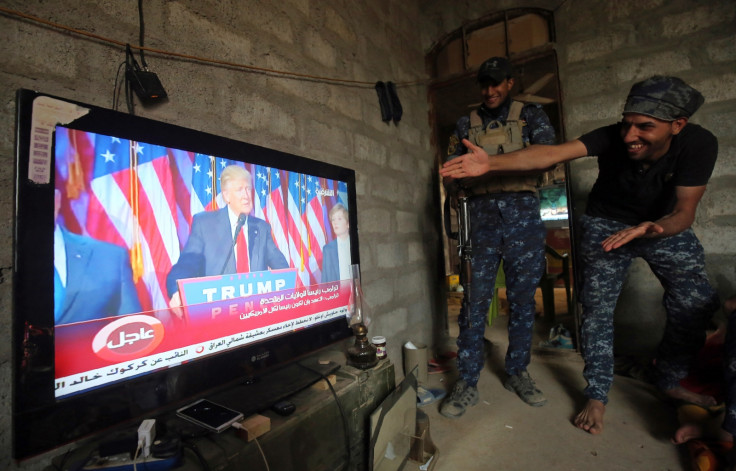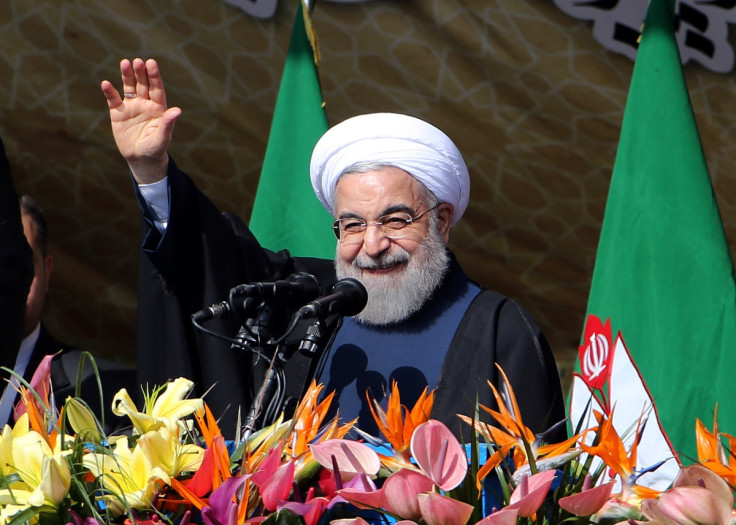From 'ripping up' Iran deal to banning Muslims – what is Donald Trump's plan for the Middle East?
The President-elect has contradicted himself often on policy towards Iran and the Arab world.

I won't pretend to have predicted a Trump presidency. In fact, I expected quite the opposite, going so far as to pen a similar piece on a Hillary Clinton presidency that was to be published following the results of November 8.
But regardless of my personal opinions on the suitability of Donald J Trump, now is the time to redirect my attention toward the future. It is important to begin sorting through the information available (the platform, various campaign promises, post-election comments, etc) in order to assess, to the best of my ability, how a Trump presidency will stand up against the reality check of existing circumstances and policies in key areas of the Middle East.
During the campaign, Syria and Iraq (and the so-called Islamic State) received the bulk of the attention. But as a Gulf analyst, I direct your attention to the GCC, Iran, and Yemen.
Before proceeding, a disclaimer is necessary: Trump has no voting record or prior government, military, or policy experience on which to base assessments. This article, therefore, takes into account positions expressed by Trump during his campaign, many of which had changed from positions previously held with with no indication that they won't evolve further.
The GCC
Two of the main concerns that arose under President Barack Obama related to his championing of the Iran nuclear deal and the related emergence of the country as a regional power, as well as the perception that the US intended to "pivot" away from the Middle East.
A Trump presidency, despite a shared opposition to the nuclear deal, is unlikely to address either of these concerns. In fact, a closer relationship with Russia and an increase in the already rising prioritisation of fighting IS over regime change will strengthen Assad, a key ally of Tehran and Hezbollah, even if that's not Trump's primary aim.
Moreover, "ripping up" the nuclear deal isn't likely to usher in an ideal world in which the agreement is renegotiated to better address critics' concerns. Rather, it could result in a worst-case situation, discussed further below, and is why former Saudi intelligence chief and ambassador to the US explained that "to scrap [the deal] willy-nilly as it were will have ramifications".
Any real effort to prevent all Muslims from entering the country is liable to create tensions with Muslim majority countries.
In addition, the entire concept of Trump's 'America First', exemplified by opposition to existing free trade agreements and certain alliances, contradicts the notions of globalisation and Pax Americana, meaning that increased US involvement in the region (or world) may be unlikely. This is particularly true if he follows through with his campaign promise to require countries under the US defence umbrella to contribute more financially or defend themselves.
That said, despite naming South Korea as one of those allegedly "free-loading" allies, he reportedly pledged his support for their defence in a post-election phone call with the country's president. It's also hard to believe that he would alienate some of the top buyers of US arms: As of March 2016, the US had sold $33bn worth of arms to the Gulf allies since May 2015. So much for freeloading. His security advisers will also certainly emphasise the importance in preserving existing counter-terrorism cooperation with the Gulf states, while Saudi Arabia is, and rightly so, seen as an key counterbalance to Iranian influence.
Another issue that could rock relations is Trump's famous 'Muslim ban'. Although a glitch triggered its removal, causing some, including Saudi Prince Alaweed bin Talal, to be encouraged that Trump the candidate and Trump the president may be different people entirely – it has now been restored.
Any real effort to prevent all Muslims from entering the country is liable to create tensions with Muslim majority countries, let alone Saudi Arabia, which sees itself as protector of the Muslim world. Trump may bypass any such disputes by either reversing position entirely or instead pursuing a policy of temporarily suspending "immigration from some of the most dangerous and volatile regions of the world that have a history of exporting terrorism". In other words, he could re-package the Muslim ban into a more acceptable policy that would essentially achieve the same results.

Iran
Alongside the majority of the Republican Party, Trump has advocated for "ripping up" and renegotiating the nuclear deal with Iran, a cornerstone of Obama's legacy. A Trump adviser recently walked this back a bit, describing his intention to "review it, send it to Congress, [and] demand from Iranians to restore a few issues or change a few issues". But it's not that simple.
Although the US can't quite rip up the nuclear deal, given that it is enshrined in a UN Security Council (UNSC) resolution, it can cease its enforcement. This could be achieved by, for example, re-implementing and/or adding further nuclear-related sanctions. In response, it is possible that continued support by the EU, Russia, and China would influence Iran to remain committed.
However, this may be the least likely given already strong opposition among hard line elements. New or reinstated US sanctions would also create further concern among European companies in particular about re-entering Iran's market and, as a result, being subject to fines for sanctions violations.
A Trump presidency and particularly any move to reverse course on the nuclear deal would significantly increase the influence of the country's hardliners.
Thus, an alternative response from Tehran could be to similarly renege on the deal. The UNSC, however, is unlikely to reimpose nuclear sanctions when the deal's collapse was the fault of Washington. This is particularly true if, despite backing out of the agreement, Iran expressed its intention to adhere to the Nuclear Non-Proliferation Treaty (NPT) and permit nuclear inspectors to remain in the country. This would leave Iran with neither international sanctions nor an agreement limiting its nuclear activity. In the worst-case scenario, Israel might see itself as left unprotected and re-examine the possibility of a strike, significantly increasing the potential for a regional conflict.
On the other hand, improved relations with Putin, Russia's continued support for the deal alongside EU and China, and the ramifications of failing to enforce the agreement, including a pretty significant loss to Boeing, might convince Trump to leave at least this element of Obama's legacy untouched. Instead, further sanctions on the IRGC and Iran's ballistic missile program might be able to somewhat appease critics of the Iran deal. And while Trump can certainly try to renegotiate the terms of the deal, it's unclear how he would do this and not at all certain that the other signatories would even entertain the idea.
Domestically, a Trump presidency, and particularly any move to reverse course on the nuclear deal, would significantly increase the influence of the country's hardliners. The perception might emerge that only an Iranian hardliner could successfully confront an American hardliner (ie. Trump), severely endangering efforts to support more "moderate", or less hard line elements and reducing President Rouhani's ability to achieve re-election come 2017.

Yemen
It is unlikely that Trump will push to drastically alter the US's current position vis-à-vis the conflict in Yemen, whether by arguing for more direct intervention (aside from one-off responses to attacks, like the anti-ship missile incidents in the Bab al-Mandeb Strait) or full withdrawal of support to the coalition. In addition to Trump's more isolationist tendencies and the above mentioned interest in maintaining a good relationship with the Gulf states, the next president will likely want to preserve the drone program.
Although garnering criticism due to civilian casualties and the resulting ability of militant groups to use it as a recruitment tool, Trump's emphasis on fighting militant Islamist groups means that he won't walk away from such program, particularly given its relative success in taking out high level al-Qaeda and IS members. The same holds true for similar practices in Afghanistan/Pakistan, Iraq, Syria, and Libya but doesn't bode well for Yemen's humanitarian situation.
A Time of Uncertainty
The most concerning element of a Trump presidency is the inability to really predict which side of the fence, or history, he'll come down on. During and now after the campaign he contradicted himself, his vice president, and the GOP on numerous occasions, walking some issues back and then forward again and promising to take action that might be impossible.
Although this may offer some comfort to those legitimately fearful of Trump leadership, uncertainty is also rarely a recipe for stability.
Miriam Goldman Eps is a regional security analyst at Le Beck International, a Middle East-based security and risk management advisory company. Follow her on Twitter: @Miriam411
© Copyright IBTimes 2024. All rights reserved.























